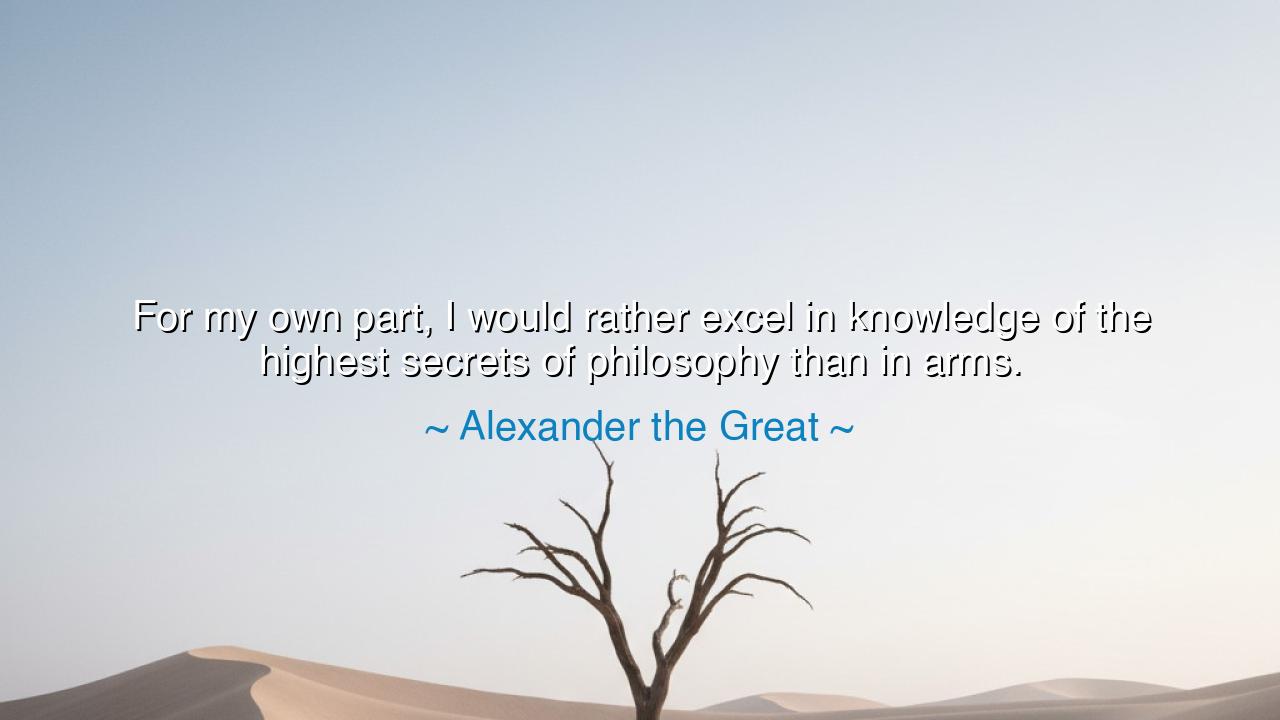
For my own part, I would rather excel in knowledge of the highest
For my own part, I would rather excel in knowledge of the highest secrets of philosophy than in arms.






Hear the words attributed to Alexander of Macedon, called the Great: “For my own part, I would rather excel in knowledge of the highest secrets of philosophy than in arms.” Strange and wondrous, that such a confession should come from the lips of one who conquered empires, who strode across the known world like a colossus, leaving cities and kingdoms in his wake. Yet in this utterance lies a deeper truth—that even the conqueror of nations recognized the limits of the sword, and that beyond the clash of arms, the pursuit of knowledge holds a nobler and more lasting crown.
Alexander was taught by Aristotle himself, the master of philosophy. From him he learned that the universe is ordered, that reason can unveil its mysteries, and that the search for truth is higher than the thirst for power. Though Alexander wielded the spear with unmatched skill, he saw that to excel in philosophy—to grasp the hidden order of life, to touch the eternal with the mind—was a greater conquest. For the victories of war fade; empires crumble; yet the treasures of knowledge endure across the ages, untouched by rust or time.
Consider the fate of many warriors whose names now lie buried in the dust. Their kingdoms rose and fell, their battles forgotten. But the words of philosophers—the dialogues of Plato, the meditations of the Stoics, the teachings of sages—still breathe life into generations. Alexander knew well that the glory of the battlefield is fleeting, but the glory of the mind is everlasting. Thus, he honored knowledge above the sword, for it gives not only dominion over men, but dominion over oneself.
And yet, Alexander was no recluse of the academy; he was a man of action. His longing for philosophy was not the denial of strength, but the recognition that true greatness unites the sword and the mind. What good is a warrior without wisdom? He becomes a tyrant, feared but unloved. What good is a philosopher without courage? He becomes a dreamer, wise but powerless. In his words, we see a balance: knowledge is the higher crown, for it guides power into justice and transforms conquest into civilization.
History shows us this union in his deeds. When he conquered Egypt, he did not only build fortresses; he founded the city of Alexandria, where scholars gathered, and where the greatest library of the ancient world was born. This act reveals his heart: that even in his wars, he sought to plant seeds of knowledge, so that wisdom would flourish beyond his lifetime. Here the conqueror showed that he valued the treasures of the mind more than the spoils of battle.
The lesson is plain for us, children of a different age: do not worship the might of arms alone, nor the glitter of power. Seek first the knowledge that governs power, the philosophy that disciplines ambition, the wisdom that directs strength. For those who excel only in force may rule for a season, but those who excel in wisdom shape the destiny of centuries. To master oneself is greater than to master armies, and to understand truth is higher than to wield the sword.
What then must you do? Train your mind as diligently as your body. Study deeply, question earnestly, meditate upon the mysteries of life. Let knowledge be your guide and philosophy your shield. Do not despise strength, but let strength be ruled by wisdom. Strive not only to build kingdoms of stone, but to cultivate kingdoms of thought, for these will endure when all else falls away.
Thus remember Alexander’s words. “I would rather excel in knowledge of the highest secrets of philosophy than in arms.” If even the mightiest conqueror confessed this truth, how much more must we? Let us therefore pursue wisdom above victory, understanding above power, so that our lives may shine not only with strength, but with meaning, and leave behind not ruins, but light for generations to come.






AAdministratorAdministrator
Welcome, honored guests. Please leave a comment, we will respond soon